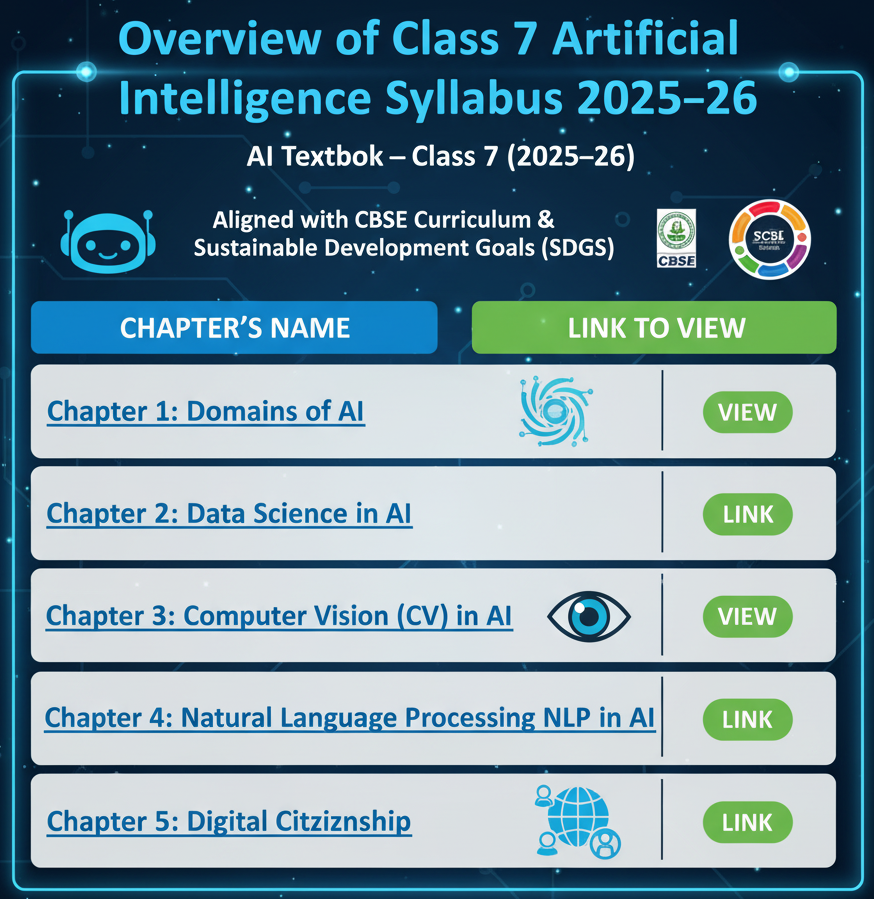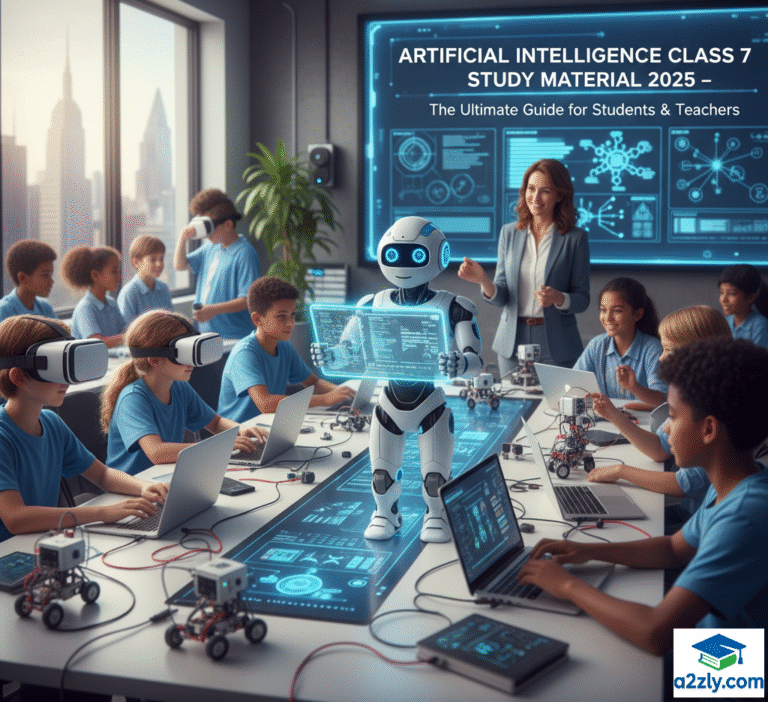🌟 Introduction
Artificial Intelligence (AI) is the foundation of tomorrow’s innovation — and it starts today in the classroom.
The Artificial Intelligence Class 7 Study Material 2025 is aligned with the latest CBSE 2025-26 Curriculum and Sustainable Development Goals (SDGs) to equip young learners with future-ready skills.
This ultimate guide explores the complete syllabus, chapter summaries, AI domains, and study strategies for students and teachers who want to excel in AI learning.
TABLE OF CONTENTS
📘 Why Class 7 Artificial Intelligence Study Material 2025 Is Essential
AI education is not just about technology — it’s about thinking creatively and ethically in a digital world.
Key reasons why this study material matters:
- 💡 Introduces students to Data Science, Computer Vision, and NLP.
- ⚙️ Builds problem-solving and logical thinking.
- 🌱 Promotes sustainability and global awareness through SDGs.
- 🤖 Encourages hands-on learning with modern AI tools.
- 🧭 Prepares students for competency-based learning as per CBSE 2025.
🧩 What’s Inside Every Chapter
Each chapter in the Class 7 AI Study Material 2025 is crafted for concept clarity and practical application.
Every unit includes:
✅ Concept Notes and Illustrations
✅ Exercises and MCQs with Answers
✅ Fill in the Blanks & Short Answer Questions
✅ Activity-Based Learning Tasks
✅ Real-Life Examples and AI Projects
This structure helps students understand AI through observation, interaction, and experimentation.
📚 Overview of Class 7 Artificial Intelligence Syllabus 2025–26

📘 AI Textbook – Class 7 (2025–26)
Aligned with CBSE Curriculum & Sustainable Development Goals (SDGs)
| CHAPTER’S NAME | LINK TO VIEW |
| Chapter 1: Domains of AI | VIEW |
| Chapter 2: Data Science in AI | VIEW |
| Chapter 3: Computer Vision (CV) in AI | VIEW |
| Chapter 4: Natural Language Processing (NLP) in AI | VIEW |
| Chapter 5: Digital Citizenship | VIEW |
| VIEW SAMPLE QUESTION PAPER | VIEW- Set 1, Set 2, Set 3 |
🧠 Chapter 1: Domains of AI
- 1.1 Introduction to Domain
- 1.2 Types of Domain
- 1.3 Introduction to AI Domains using Applications
- 1.4 Artificial Intelligence: Exploring
- 1.5 Sustainable Development Goals (SDGs)
- 1.6 What is Systems Thinking?
- 1.7 System Maps
📊 Chapter 2: Data Science in AI
- 2.1 Introduction
- 2.2 Data and its Types
- 2.3 Big Data
- 2.4 Data Science
- 2.5 Importance of Data Science in AI
- 2.6 Data Science Games
👁️ Chapter 3: Computer Vision (CV) in AI
- 3.1 Introduction
- 3.2 Computer Vision
- 3.3 How computer vision works in AI
- 3.4 Examples of computer vision in Action
- 3.5 Importance of computer vision
- 3.6 Games that use computer vision
💬 Chapter 4: Natural Language Processing (NLP) in AI
- 4.1 Introduction
- 4.2 How NLP Works
- 4.3 Working of NLP with Examples
- 4.4 Importance of NLP
💻 Chapter 5: Digital Citizenship
- 5.1 Introduction to citizenship
- 5.2 The concept of Digital citizenship
- 5.3 Responsibility & Netiquette
- 5.4 Digital Drama
- 5.5 Do’s and Don’ts of Online communication.
- 5.6 Digital Footprints
- 5.7 Cookies
- 5.8 Cyber Security
🔗 Learning Resources for Class 7 AI 2025
- 📘 CBSE Skill Education Portal – official curriculum.
- 💡 NCERT AI Toolkit – worksheets and interactive PDFs.
- 💻 Atal Tinkering Labs Projects – AI model building.
- 🎥 DIKSHA Videos – animated lessons.
- 🌍 UNESCO AI in Education – ethical AI practices (source).
🧠 Study Smarter: How to Use the AI Study Material Effectively
- Understand, Don’t Memorize. Use real-life examples to relate concepts.
- Practice Regularly. Attempt MCQs and fill-in-the-blanks after each chapter.
- Collaborate. Work in pairs for AI projects or lab activities.
- Reflect on Ethics. Apply Digital Citizenship lessons to online behavior.
- Experiment with AI Tools. Try Teachable Machine, Canva AI, ChatGPT for practice.
📊 Competency-Based Learning (CBSE 2025 Focus)
The 2025 CBSE framework shifts from rote learning to competency-based assessment.
AI learning outcomes include:
- Analytical and design thinking
- Real-world problem application
- Ethical judgment and sustainability awareness
❓ FAQ – Class 7 Artificial Intelligence Study Material 2025
Q1. Is AI mandatory in Class 7 CBSE curriculum?
➡ No, it’s an optional skill subject under ICT/ATL, but widely recommended.
Q2. How does AI link with Sustainable Development Goals?
➡ AI projects help achieve SDGs like clean energy, quality education, and climate action.
Q3. Can students practice AI online?
➡ Yes, via free tools like Google Teachable Machine and Scratch with AI.
Q4. Will this appear in exams?
➡ Yes, schools may conduct MCQ, short-answer, and activity-based assessments.
Q5. Where can teachers get lesson plans?
➡ On the CBSE Skill Education Portal and NCERT’s AI Handbook 2025.
✅ Conclusion
The Artificial Intelligence Class 7 Study Material 2025 is your gateway to the future of learning — blending CBSE skills, SDGs, and hands-on innovation.
By understanding AI domains, exploring data science projects, and adopting digital citizenship, students develop both tech skills and ethical values.
For teachers, this guide is a complete resource to deliver engaging, competency-based AI education in 2025 and beyond.
🔗 Internal Links (Examples)
- CBSE Skill Subjects 2025 Overview
- AI Projects for Students Class 7–8
- Digital Citizenship Lesson Plans

